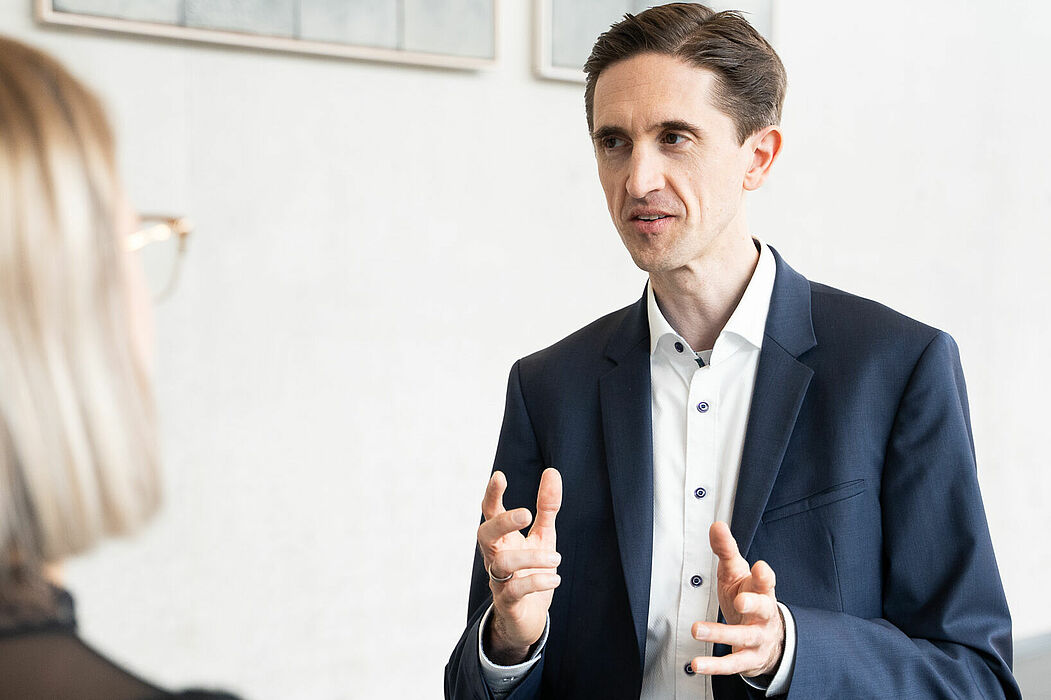Prof Dr Daniel Reimsbach, an expert in business administration, particularly reporting, governance and sustainability, shows how the two worlds of sustainability and accounting are merging. In a promising professional field, he links figures and sustainability and explores how they influence our decisions.
Accounting - that's financial management and cost accounting, but doesn't have much to do with sustainability? Daniel Reimsbach has to disagree - because he knows: "All sub-disciplines of accounting are increasingly concerned with sustainability." Internally, for example, companies have to deal with aspects of sustainability assessment to support management decision-making. This means, among other things, that the company develops sustainability guidelines to make its own operations and internal processes more sustainable. It also includes internal reporting and monitoring of the implementation of these sustainability measures. Externally, the aim is to communicate the company's sustainability performance to external stakeholders. In other words, it is about how the company is perceived externally in terms of sustainability.
Communicating the spirit in the lecture theatre
Accordingly, Daniel Reimsbach is also convinced that sustainability-orientated accounting is a "very promising professional field" for the future. "Hiring in this field is at a high level," he explains. The digital transformation is also leaving its mark on accounting: "The traditional image of the profession will change, as some reporting and auditing methods will become obsolete, for example," but ultimately these are just new challenges that need to be faced. And he wants to pass this message on to his students in the lecture theatre: On the one hand, his spirit for sustainability and accounting and the future viability of these disciplines, but also the motivation to intrinsically engage with content and stay on the ball. "If the students combine a fundamental interest with self-management and learning management, then they will have a successful degree programme," motivates the 43-year-old.
International experience in the Netherlands
Daniel Reimsbach has already got to know a few students and therefore knows that there is no "one ideal type". He currently lives with his family in Neukirchen-Vluyn and until a few months ago he taught at Radboud University in the Netherlands. The university system he got to know during his time there reminded him clearly of the American system. The faculties there are organised into different departments with a very international focus. As a result, not only the lectures and seminars for business students were held in English, but also the administrative processes such as department meetings. As Associate Professor of Accounting, Daniel Reimsbach has already dealt a lot with aspects of sustainability accounting. "I built up this focus over my seven years in the Netherlands," he says, looking back. As part of the Paderborn Research Centre for Sustainable Economy (PARSEC), he will continue and expand this focus in Paderborn.
Experimental research methods
His research focusses on sustainability information in a variety of forms. The focus is always on the impact of information on the decisions of different target groups and how it influences how managers, for example, report on the company. This results in a continuous cycle. Accounting plays a central role here, as sustainability information is considered in relation to internal management (sustainability controlling) and external reporting (sustainability reporting). Measurability always takes centre stage: "Only what can be measured can also be managed," explains Daniel Reimsbach. The new appointee's research methodology is mainly based on experiments in which test subjects are exposed to information in the laboratory or in real-life situations on the basis of which they have to make decisions. The fact that the participants receive slightly altered information, i.e. the information is "manipulated", makes it possible to causally understand whether other decisions can be attributed to altered factors.
Perception of labels and sustainability terms?
In one study, the researcher looked at whether it makes a difference if a sustainability report is presented separately or in combination with traditional financial data. And the experimental studies showed that the report format, including the presentation of audit seals, does indeed have a significant influence on perception. However, the question always remains as to what extent the findings from the laboratory can be transferred to the real world. It therefore makes sense to combine different methods in order to better generalise the results. "In an academic career, however, you simply have to get to grips with many methods and find the one that is close to your heart," says Daniel Reimsbach - and for him it is experimental studies.
Change in the academic world
"But science is constantly changing," he reports with a glance at his publications. He also remembers the time when he was socialised academically to the extent that every business scientist had to have published once in a well-known business journal of German origin in order to make a name for themselves. "In 2013, I had my first publication as a sole author in such a journal and at the time it was a great success for me," says Daniel Reimsbach with a smile, as today this publication is no longer worth as much in the rankings. The reason for this? Science has long been internationalised and developed further. Collaboration with colleagues from different sub-disciplines is therefore all the more important to him, especially in the field of sustainability, which spans various sub-disciplines of business administration. This interdisciplinarity enables him to find and promote common interests, which is why he sees a lot of potential in PARSEC in particular. During his own studies, he was also fascinated by the connection to other disciplines and the opportunity to get a taste of other sub-areas - "and I still hold on to that today."

